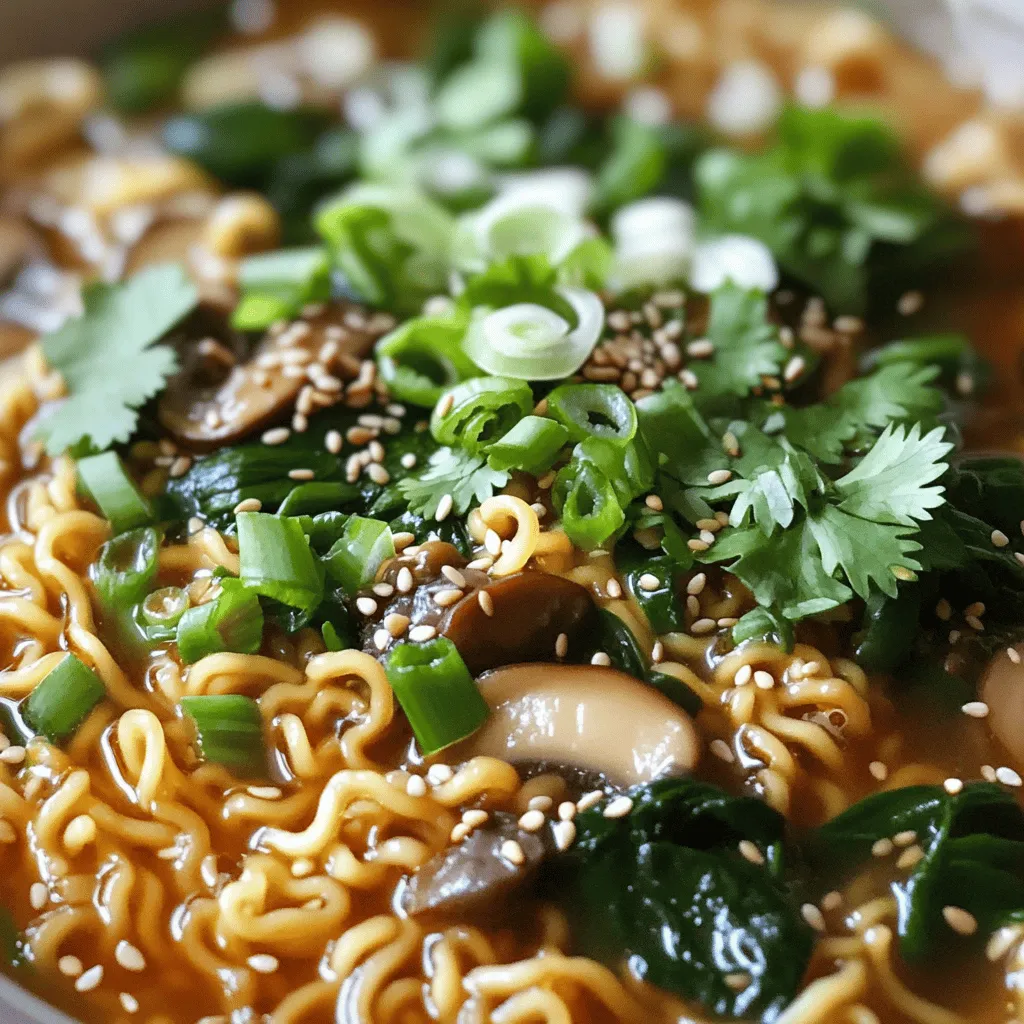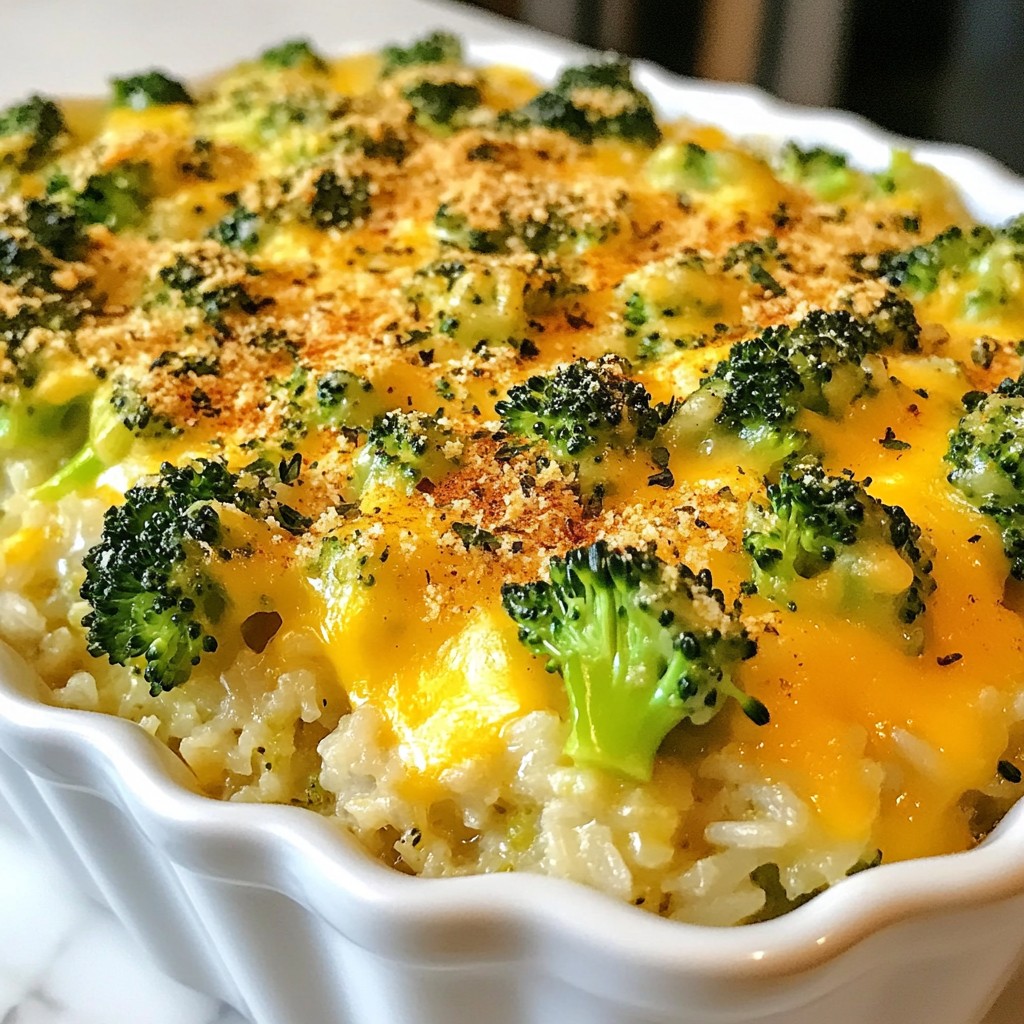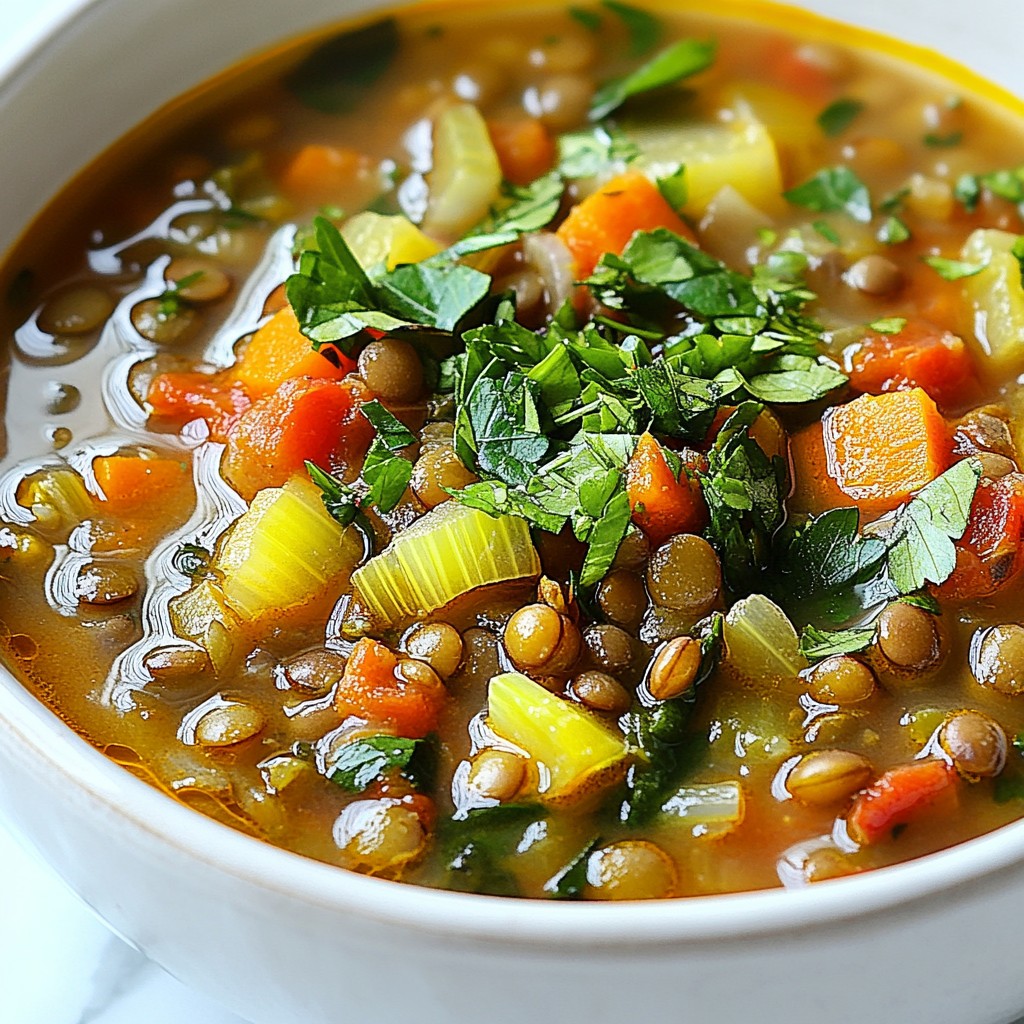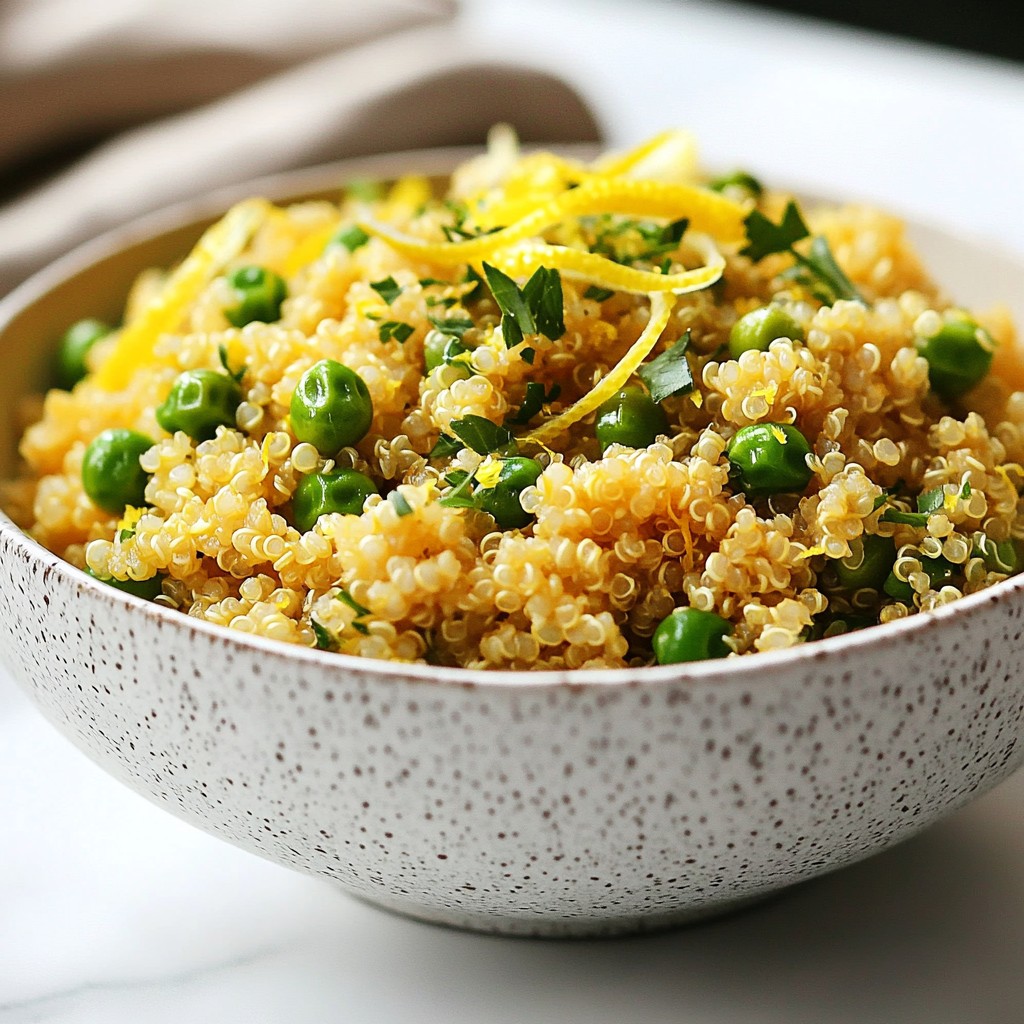Are you ready for a bowl of steaming goodness? My Asian Mushroom Ramen Noodles are the perfect comfort dish to warm your soul, combining rich flavors and fresh ingredients into a delightful meal. With tender noodles, savory mushrooms, and a fragrant broth, this dish is sure to become a family favorite. Follow my easy steps to create a delicious ramen experience that will impress everyone at your table. Let’s get cooking!
Ingredients
Detailed Ingredient List
– Ramen noodles: 200g
– Mushrooms: 250g shiitake & 100g enoki
– Aromatics: garlic and ginger
– Broth and seasonings: vegetable broth, soy sauce, miso paste, chili paste
– Fresh greens and garnishes: baby spinach, green onions, toasted sesame seeds, cilantro
When I make Asian mushroom ramen, I focus on fresh, vibrant ingredients. Ramen noodles are the heart of this dish. They soak up flavors and bring a satisfying chew. I prefer using 200g of ramen noodles for two to three servings.
Mushrooms add depth and umami. I like to use 250g of shiitake mushrooms and 100g of enoki mushrooms. Shiitake offers a robust flavor, while enoki adds a nice crunch.
Aromatics like garlic and ginger kick up the taste. I always use three cloves of minced garlic and a one-inch piece of grated ginger for that perfect zing.
The broth is key to a great ramen. I choose four cups of vegetable broth, along with two tablespoons of soy sauce. For an extra boost, I add one tablespoon of miso paste and one teaspoon of chili paste. Adjust the chili paste based on your spice level.
Fresh greens make the dish come alive. I add one cup of baby spinach, which wilts perfectly in the hot broth. For garnishing, I slice two green onions, sprinkle one tablespoon of toasted sesame seeds, and add fresh cilantro.
With these ingredients, you will craft a bowl of flavorful comfort.
Step-by-Step Instructions
Cooking the Ramen Noodles
To cook the ramen noodles, start by boiling water in a large pot. Add a pinch of salt to the water. Once it boils, add 200g of ramen noodles. Cook them according to the package instructions, usually around 3-4 minutes. Drain the noodles in a colander and set them aside. To prevent sticking, toss them with a splash of sesame oil. This keeps them separate and adds a nice flavor.
Sautéing Aromatics
For the aromatics, heat 1 tablespoon of sesame oil in a large skillet over medium heat. Add 3 cloves of minced garlic and 1 inch of grated ginger. Sauté these for about 1 minute until they smell great. Make sure the heat is not too high, or the garlic will burn. Cooking at the right temperature helps keep the flavors bright and fresh.
Combining Ingredients
Now, it’s time to build your flavor! Increase the heat to medium-high. Add 250g of sliced shiitake mushrooms and 100g of trimmed enoki mushrooms to the skillet. Sauté them for about 5-7 minutes, stirring often, until they are tender and slightly caramelized. Pour in 4 cups of vegetable broth next. Bring it to a simmer and stir in 2 tablespoons of soy sauce, 1 tablespoon of miso paste, and 1 teaspoon of chili paste. Let everything cook for another 5 minutes so the flavors meld beautifully. Then, add the cooked ramen noodles and 1 cup of baby spinach to the broth. Stir gently until the spinach wilts, which should take about 2 minutes. Now you can serve! Ladle the soup into bowls and add sliced green onions, toasted sesame seeds, and fresh cilantro for garnish. Enjoy this flavorful comfort dish!
Tips & Tricks
Best Practices for Flavor
To make your Asian mushroom ramen noodles shine, focus on your broth first. A rich, flavorful broth can elevate your dish. Use high-quality vegetable broth. If you want extra depth, add miso paste. This gives a nice umami boost. You can also adjust ingredients based on your taste. Add more garlic or ginger for a bolder flavor. If you like heat, increase the chili paste.
Cooking Techniques
Perfect sautéing is key to great flavor. Start with medium heat when cooking garlic and ginger. This keeps them fragrant without burning. When adding mushrooms, raise the heat to medium-high. This helps them caramelize and release their natural flavors. To avoid mushy noodles, don’t overcook them. Follow the package instructions carefully. Rinse them with cold water after cooking to stop the cooking process.
Presentation Tips
Garnishing makes your dish pop! After serving, sprinkle sliced green onions on top for color. Add toasted sesame seeds for crunch and a nutty flavor. Fresh cilantro adds a bright touch. For special occasions, serve in nice bowls. You can also add a lime wedge on the side for a zesty finish. This simple step can impress your guests and enhance the meal. Enjoy your flavorful comfort dish!
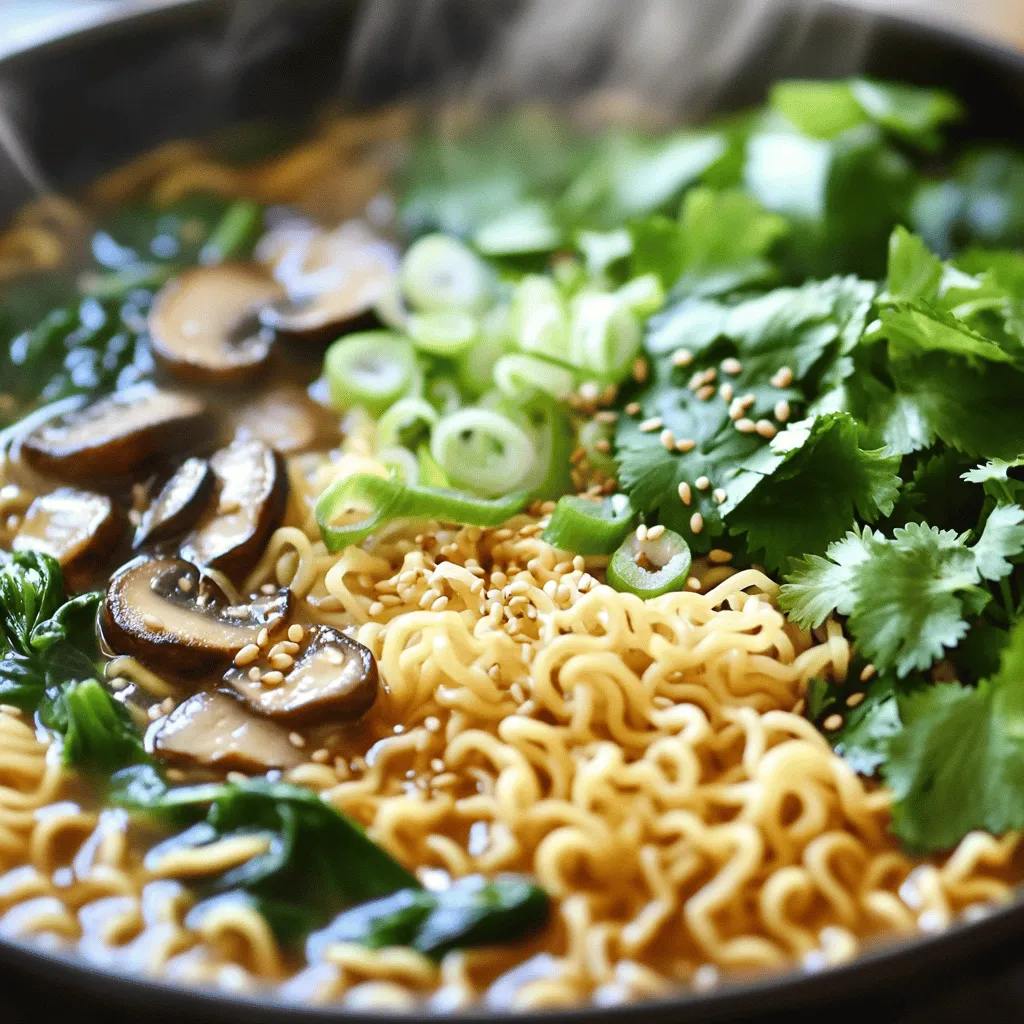
Variations
Add Protein
You can easily add protein to your Asian mushroom ramen. Tofu is a great choice. It absorbs flavors well and adds texture. Simply cube it and sauté it with the mushrooms. For meat lovers, chicken works too. Use cooked, shredded chicken for quick prep. Shrimp is another tasty option. Just add it in the last few minutes of cooking. This way, it stays tender and juicy.
Vegan Options
To keep the dish vegan, skip the chicken or shrimp. You can replace them with extra mushrooms or tofu. Many veggies also fit well. Try adding bok choy or carrots for crunch. Zucchini or bell peppers can add color and flavor. Feel free to mix and match your favorite vegetables. This keeps your ramen fresh and exciting.
Spicy vs. Mild
You can control the spice level in your ramen. If you like it mild, reduce the chili paste. Start with half a teaspoon and adjust to taste. For those who love heat, add more chili paste or fresh chili slices. You can also use sriracha for a different kick. Just remember to taste as you go. This way, you create the perfect bowl for your palate.
Storage Info
Storing Leftovers
To store your Asian mushroom ramen noodles, follow these simple steps. First, let the dish cool down to room temperature. Then, place it in an airtight container. You can refrigerate it for up to three days. If you want to keep it longer, freeze it. In the freezer, it will last for about a month. Just be sure to separate the noodles from the broth to avoid mushy noodles later.
Reheating Tips
When you’re ready to enjoy leftovers, reheating properly is key. Use a saucepan over low heat for best results. Add a splash of water or broth to keep it moist. You can also microwave it, but cover it with a damp paper towel. This helps maintain moisture. Stir occasionally to heat evenly. This way, your flavors and texture will stay great, just like the first time you made it!
FAQs
What type of mushrooms work best for this recipe?
Shiitake and enoki mushrooms shine in this dish. Shiitake mushrooms are rich and earthy, adding a deep flavor. They also have a meaty texture that enhances the broth. Enoki mushrooms offer a delicate crunch and mild taste, creating a nice contrast. You can also try oyster mushrooms for a buttery flavor. Each type brings its own unique taste, making your ramen even better.
Can I substitute ramen noodles with other types?
Yes, you can use different noodles. Soba noodles are a great choice. They have a nutty flavor that pairs well with the broth. Udon noodles are thicker and chewier, adding a nice bite. Rice noodles work too, especially for gluten-free options. Just cook them according to their package instructions and add them to the broth.
Is it possible to make this dish gluten-free?
Absolutely! You can use gluten-free ramen or rice noodles. Be sure to check the labels for gluten-free options. For the broth, use tamari instead of soy sauce. This provides the same salty flavor without the gluten. Miso paste can also be gluten-free, just verify the brand you choose.
How can I enhance the umami flavor?
To boost umami, add a tablespoon of miso paste to the broth. It gives depth and richness. You can also toss in a few dried shiitake mushrooms while simmering. They will release more flavor into the broth. Adding a splash of soy sauce or a few drops of fish sauce will also enhance that savory taste. These tips will make your ramen even more delicious.
In this guide, we explored the elements that make a delicious ramen dish. We covered key ingredients like noodles, mushrooms, and broth. You learned how to cook the noodles and sauté the aromatics for rich flavor. We also shared tips to enhance taste, serve beautifully, and store leftovers.
Ramen is versatile and fun to customize. Whether you add protein or adjust spices, your dish will shine. Experiment with different ingredients to create your perfect bowl. Enjoy your ramen journey!
